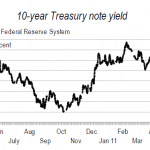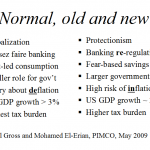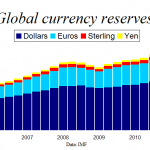So you think the dollar is washed up as a reserve currency, destined to live up to the jibe “American peso.” Better whip out your library card and retrieve the column of Mansoor Mohi-uddin, managing director of foreign-exchange strategy at UBS, on Page 22 of the Financial Times May 11, [continue reading . . . ]
I said it on KUOW’s Weekday program today, and I’ll say it here: I’m from Missouri concerning Microsoft’s announced $8.5 billion acquisition of Skype, the service that allows users to make voice or video calls using the World Wide Web free or at very low cost. I understand what the [continue reading . . . ]

Interest rates were supposed to go up when the end of quantitative easing (printing money) came into focus. That was the gospel according to Pimco’s Bill Gross, who dumped all his Treasuries, who indeed went short the U.S. government-bond market. But as the chart shows, the benchmark rate on 10-year [continue reading . . . ]
Delivered with my New York Times on May 6, what is labeled the “Seattle Inaugural Issue” of China Daily, self-described as “the national English-language newspaper of the People’s Republic of China.” The paper runs 20 pages and is relatively unremarkable, with a couple of exceptions. First, there are almost no [continue reading . . . ]

Mohamed El-Erian and Bill Gross of Pacific Investment Management Company (Pimco), the world’s largest fixed-income manager, to the best of my knowledge originated the phrase “new normal” to indicate that things fundamentally changed following the Panic of September 2008 and its aftermath. After studying a number of their writings, freely [continue reading . . . ]
I’ve said in this space before that I love newspapers. Of the four dailies I read, the one I would take to a desert island is, without question, the Financial Times. The pleasures of the salmon-colored broadsheet include such political insights as the following from Clive Crook, the newspaper’s chief [continue reading . . . ]
Fed Chair Ben Bernanke’s historic press conference, economic policy, high-speed rail and Boeing’s travails with the 787 were among topics on KUOW’s Weekday program today. The Seattle Times columnist and blogger Jon Talton and I batted these and other issues around for nearly 40 minutes with host Steve Scher. Here’s [continue reading . . . ]
The U.S. is in such dire financial shape that it must raise taxes on the middle class as well as the rich AND curtail, via means-testing, giant entitlement programs, including Social Security and Medicare. That’s the Easter Sunday sermon from supply-side guru and former OMB director David A. Stockman via [continue reading . . . ]
Will the bond market tank when the Fed stops buying Treasury paper in a few weeks? As reported in today’s Wall Street Journal, two of the biggest players in the fixed-income market are at polar opposites. They both can’t be right. As I told a friend today, this is why [continue reading . . . ]
As reported in today’s New York Times, convicted Florida mortgage fraudster Lee Farkas related this anecdote about doing business with his commercial banker, Catherine Kissick of Colonial Bank: “One day she was at the McDonald’s drive-in, and I asked her for a hundred — which meant a hundred million — more, [continue reading . . . ]

Is the dollar’s long run as the global reserve currency coming to an end? It is if the Chinese have anything to say about it. China owns the globe’s largest store of dollar-denominated assets outside the U.S. Understandably, it wants to diversify. The world needs an “international reserve currency that [continue reading . . . ]
Richard W. Stevenson writes in Sunday’s New York Times Week in Review section that the debate in Washington over spending, debt, deficits and entitlements amounts to the most fundamental reassessment of the size and role of government since Ronald Reagan and perhaps since Franklin Roosevelt. Here’s an excerpt: The battle [continue reading . . . ]